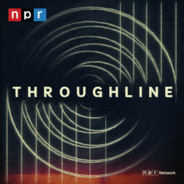
Kultur & Gesellschaft
Throughline Folgen
Throughline is a time machine. Each episode, we travel beyond the headlines to answer the question, "How did we get here?" We use sound and stories to bring history to life and put you into the middle of it. From ancient civilizations to forgotten figures, we take you directly to the moments that shaped our world. Throughline is hosted by Peabody Award-winning journalists Rund Abdelfatah and Ramtin Arablouei.Subscribe to Throughline+. You'll be supporting the history-reframing, perspective-shifting, time-warping stories you can't get enough of - and you'll unlock access bonus episodes and sponsor-free listening. Learn more at plus.npr.org/throughline
Folgen von Throughline
-
Folge vom 10.11.2022Dreams, Creatures, and VisionsWe are in the season of chaos. It can feel like everything is happening at once: You might be sprinting across an airport; or around your kitchen, with a few too many dishes cooking at once. Your phone keeps pinging — texts, weather alerts, and more and more breaking news. Here at Throughline, we're always going to different places in time and space. So this week, come with us: to another time, another place, another realm. In this episode, we'll be your sonic travel guides on a journey through bite-sized pieces of Throughline's most immersive episodes, from the shadowy world of dreams, to the midst of the Revolutionary War, to the haunting music of Radiohead and their visions of the future.Learn more about sponsor message choices: podcastchoices.com/adchoicesNPR Privacy Policy
-
Folge vom 03.11.2022The Most Sacred Right (2020)Born into slavery in the early 1800s, Frederick Douglass would live to see the Civil War, Emancipation, Black men getting the right to vote, and the beginning of the terrors and humiliations of Jim Crow. And through all of that, he kept coming back to one thing, a sacred right he believed was at the heart of American democracy: Voting. Next week is the midterm election. So this week, we're bringing you an episode we originally published right before the 2020 election. And we're tackling a question that still feels very timely — a question that both haunted and drove Frederick Douglass his entire life. Is our democracy set up to include everyone? And if not... can it ever be?Learn more about sponsor message choices: podcastchoices.com/adchoicesNPR Privacy Policy
-
Folge vom 27.10.2022The State of DisunionIs the U.S. on the brink of civil war? It's a question that has been in the air for a while now, as divisions continue to worsen. Beyond the political speeches and debates in the halls of Congress, it's something you're likely feeling in your day-to-day life. Vaccines, school curriculums, climate change, what you define as a human rights issue, even who you call a friend. Some say we've moved beyond the point of discussion. But when words fail, what comes next? In conversation with Malcolm Nance, Anne Applebaum, and Peniel Joseph, we take a deeper look at what we mean when we say civil war, how exactly the country reached this political moment, and where we go from here.Learn more about sponsor message choices: podcastchoices.com/adchoicesNPR Privacy Policy
-
Folge vom 20.10.2022The Woman QuestionWhat's happening in Iran right now is unprecedented. But the Iranian people's struggle for gender equality began generations before the death of 22-year-old Kurdish Iranian woman Mahsa Amini, also known by her Kurdish name, Jina Amini. The successes of this struggle, as well as its setbacks and horrors, are well-documented, but often misunderstood. Scholar Arzoo Osanloo argues that women have been at the center of Iran's century-long fight for freedom and self-determination. It's a historical thread that goes all the way back to Iran's Constitutional Revolution in the early 20th century: A complicated story of reform, revolution, and a fundamental questioning of whether Iranian people — and people around the Islamic world — will accept a government of clerics as the sole arbiters of Islam and the state.Learn more about sponsor message choices: podcastchoices.com/adchoicesNPR Privacy Policy
